Looking Over My Shoulder At Early Sobriety
Oh the books I read! The notes I jotted! The journals I wrote!
I went to grab a book off my sobriety shelf yesterday. Yes – don’t laugh – there is such a thing. There is also a sobriety file box stuffed with journals. And a sobriety notebook.
I don’t often look at the journals; they are extremely painful. I keep the file box way in the back of my closet and have instructed my husband to burn it should I meet with an untimely end. But the little notebook — a collection of quotes and sayings I jotted down whenever I heard or read something enlightening — travels back and forth between my desk and my bedside table, sometimes hitchhiking in the bookbag that I take on my travels.
The bookshelf? It’s more like a shelf and a half, about 70 books sandwiched between memoir and poetry on one of three cheap wooden bookshelves tucked into the nook under the eaves that forms half of my home office.
I furtively acquired and read more than a few of these books in the year leading up to my last drink. The rest I collected and dogeared during early sobriety – “early” sobriety being a period of time far longer than I could have imagined. It took me a while, as they say, to get my marbles back. Or more accurately, to find some marbles I never knew I had.
Anyway, as always happens, yesterday when I reached into the shelf to grab a book I wanted to lend a friend, my hand came out with something for me instead. In a matter of minutes, I was on the floor with half a dozen books around me, the dog wondering why I had commandeered his proprietary rug. Only the sound of the coffee machine beeping (oh good, more decaf!) popped me out of my rabbit hole.
As I stood up on half-numb feet and stepped back from the shelf, I was suddenly struck by the overwhelming evidence of struggle – so many books, so much navel-gazing! I did chuckle a little, and I could have cringed with feelings of embarrassment. But that’s not what I felt. I truly felt a rush of empathy for that girl who was so twisted up in knots. She – I – was trying so hard to get to the other side of the wall, without knowing how high or how wide it was. Apparently, I thought reading and scribbling notes would help. And it did, to a point.
I tell you all this from the comfortable (but never too comfortable) spot on the other side in case you are struggling or know someone who is. Books and journals and notebooks cannot begin to take the place of asking for help from real live people, but for me they were an important way of trying to understand what I was up against.
Because I very definitely did not understand. I spent an entire year — after fitful stops and starts for five years before that — earnestly trying to stop drinking on my own accord. I was under the mistaken impression, based on the evidence in my family of bonafide alcoholics who seemed much worse off than me (in some cases worse meaning dead), that I was a problem drinker, a life-long daily drinker with a high tolerance and an increasingly greedy thirst that seemed unquenchable — but not an alcoholic. That was partly denial but also partly because I didn’t fully understand the definition of an alcoholic. Until I read it in a book. A couple books.
An alcoholic is a person who can’t predict, once she or he takes the first drink, how many drinks they will have or when they will be able to stop drinking.
In other words, an alcoholic has lost control over how much they will drink on any given occasion, whether they are a daily drinker or a binge drinker. Once the first drink is taken, all bets are off. Ironically, it’s all about control. Which makes the lack of control particularly hard to fathom for a person who leans on controlling to survive, who grew up in a controlling household.
Several years before I got sober, I quit drinking for five months after reading Caroline Knapp’s Drinking: A Love Story for the first time. Knapp was a young Boston journalist and I thought she was telling my story – I related to her that much. The book also introduced me to the “quiz.” There are variations on this 26-question test from the National Council on Alcoholism and Drug Dependency out there, but they all are designed to trick you.
You go along answering the yes/no questions thinking you’re not so bad because you’re only saying yes to some of them, not all of them. You get to the end and instead of instructions on how to score, you are told that even one “yes” means you are at risk for alcoholism; more than one “yes” indicates that you likely have an alcohol problem that requires attention. Oy. For me, taking this test was the first time I realized that some of my behaviors were not normal. In my family and my cultural milieu, everyone drank daily. It didn’t occur to me that the vast majority of people didn’t.
Not long after I took this quiz and finished Knapp’s book, I woke up one morning and counted the empty wine bottles in the kitchen; there was one more than I remembered. “Hmmm,” I thought, “Maybe I do have a problem.” I then proceeded to white-knuckle my way through five months of not drinking. I felt so accomplished that I declared myself fine and started drinking again. (This isn’t unusual in the march to the end.)
That was the last time I was able to piece together any significant amount of time. I tried to do “dry” February (not January; February is the shortest month) with my (then) husband the next year and gave up after ten days. My life only got more stressful, I drank more, and my brain adjusted to the increase in alcohol by letting me know it wasn’t happy if it didn’t get an appropriate dose. If I tried to go more than 24 hours without a drink, my serotonin levels dropped precipitously, and a dark depression fell like a theater curtain before I knew it. I could barely get out of bed – and I was editor in chief of a magazine. I couldn’t afford to be nonfunctional, so, ironically, I just kept drinking. (I’m sorry to digress, more on that another time.)
I reread Drinking: A Love Story close to the end. By that time I was poking into books like Under the Influence: A Guide to the Myths and Realities of Alcoholism and Beyond the Influence: Understanding and Defeating Alcoholism both by Katherine Ketcham (with other experts).
But the books that spoke to me loudest when I got to the other side were those that examined the spiritual malady of alcoholism. These were the books that helped me understand how disconnected I had become not just from a power outside myself but from the strength and spirit deep within me. I read Buddhist and Christian authors and self-help gurus (I’m not ashamed!) and scribbled in my notebook anything that resonated with me. A book called A Place Called Self: Women, Sobriety, and Radical Transformation (Stephanie Brown), along with work I was doing with real live people, was especially revealing to me. I was horrified, but ultimately relieved, to learn that I had been pretending to be someone I wasn’t. I had leaned on the bravado I got from drinking to cover up my shyness and insecurities and to fulfill the expectations I thought others had of me.
Most of my books are dated now so I can’t recommend them all — though you can never go wrong with anything Anne Lamott has written in the past or will write in the future. She is a beacon of hope. And Gerald G. May’s Addiction & Grace: Love and Spirituality in the Healing of Addictions is one I read again and again. May was a psychiatrist and theologian who believed that addiction was rooted in our attempts to assert complete control over our lives. In his books and practice, he encouraged a process of letting go of attachment, developing an open and contemplative life, and learning to live with both discomfort and love.
I leave you with some snippets from my sobriety notebook. My friend Elissa told me there is a name for this kind of verbal scrapbook – a commonplace book. I never knew about commonplace books, but they have a fascinating history and were used for centuries by everyone from housewives to Charles Darwin for organizing thoughts and information. Anyone can create a commonplace book. Why don’t you?
P.S. A quick note to let you know that I have imported a few older posts from my former blog on sixburnersue.com. While many of you have been with me for years, we are adding lots of new subscribers here on Substack (yay and welcome!), and I’m thinking some of these posts — particularly Skipping Generations, Or Not: If Nana had gotten the help I got, how would things have been different? — might help fill in the gaps for people wondering why I’m writing about gardening one minute and sobriety the next!
And by the way, let me know in the comments what books have meant the most to you on your spiritual journey!
“It may be that when we no longer know what to do, we have come to our real work and when we no longer know which way to go, we have begun our real journey.”
— Wendell Berry


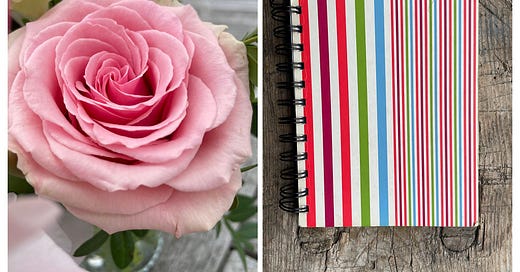



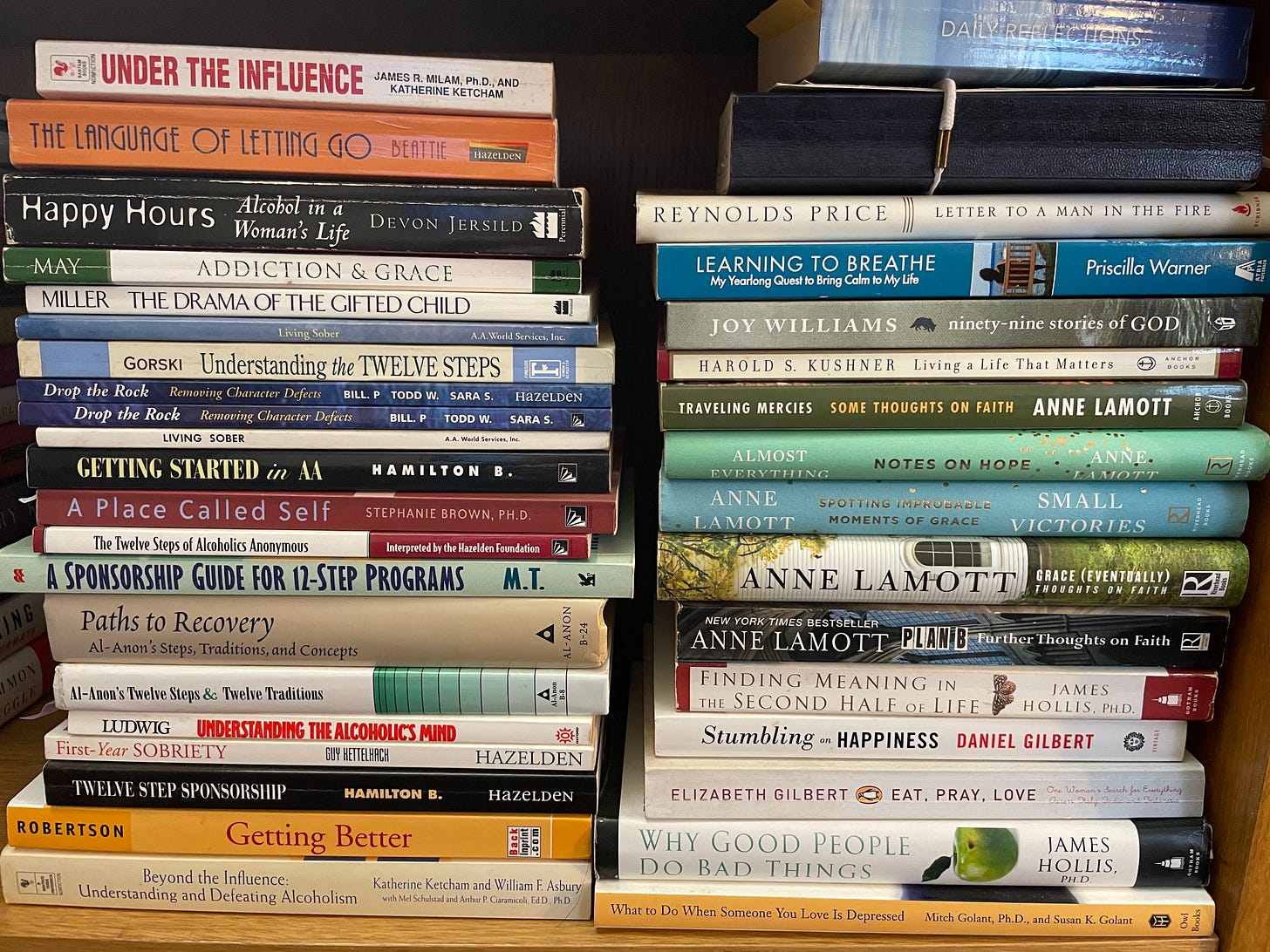
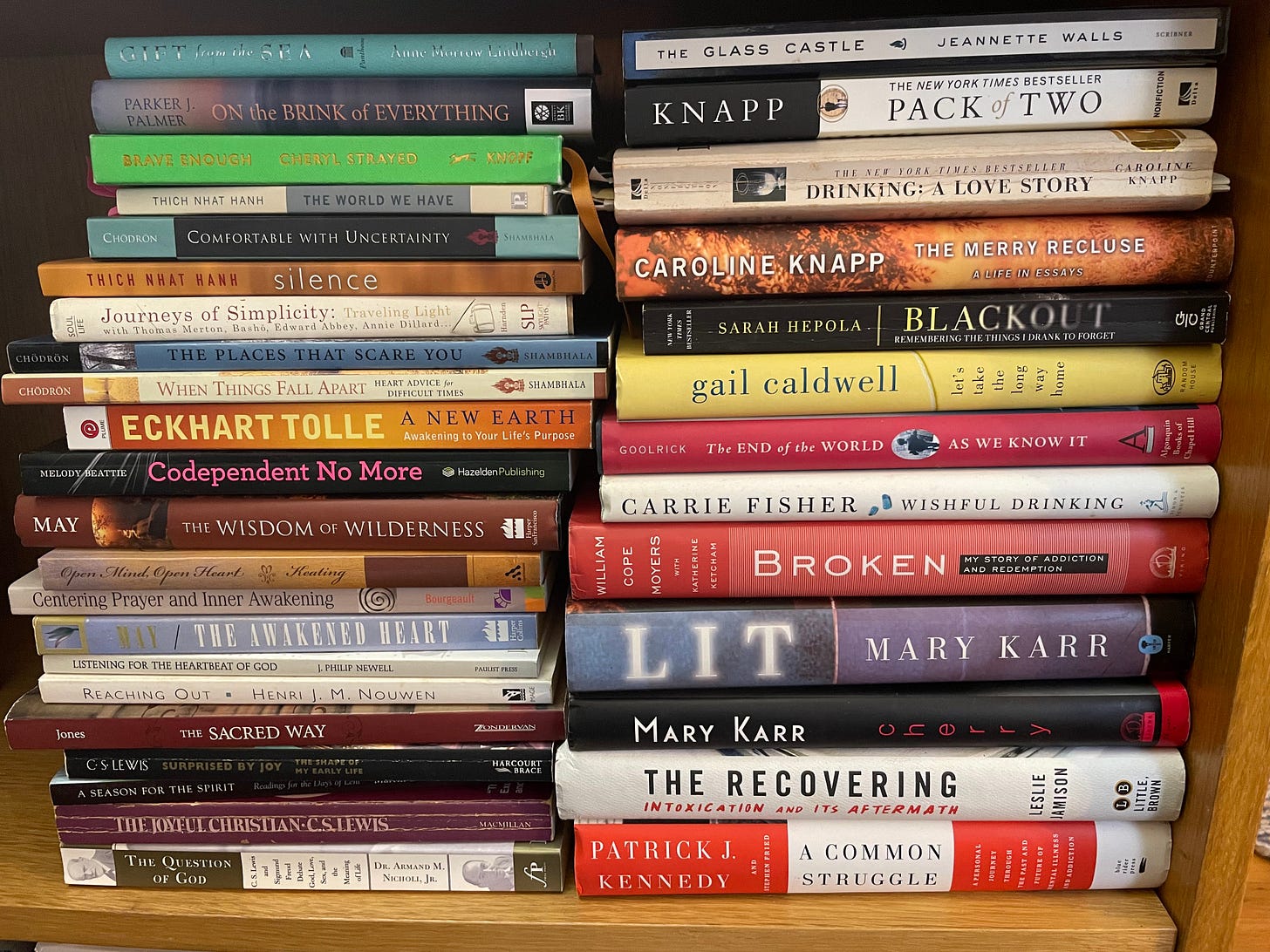
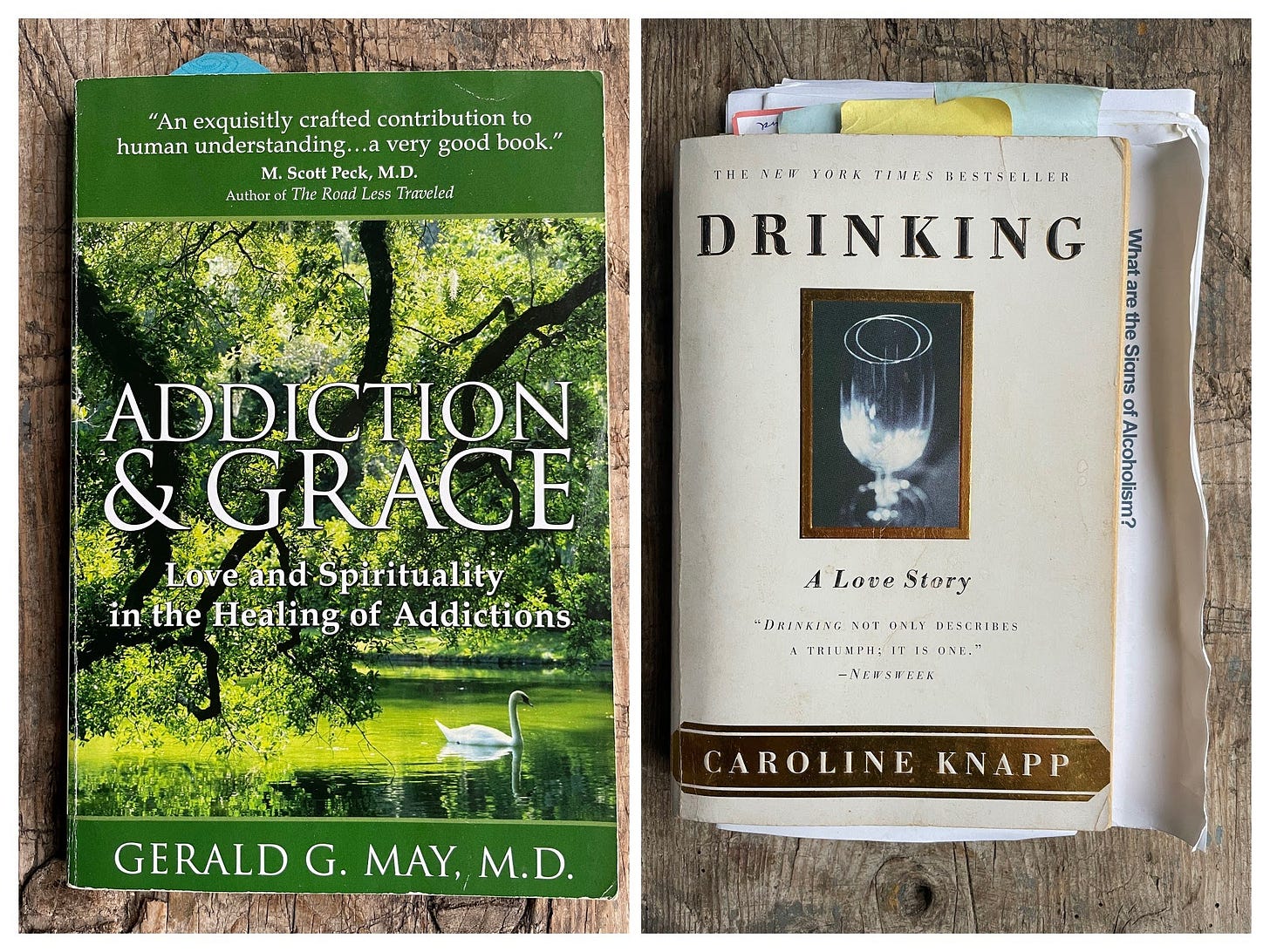
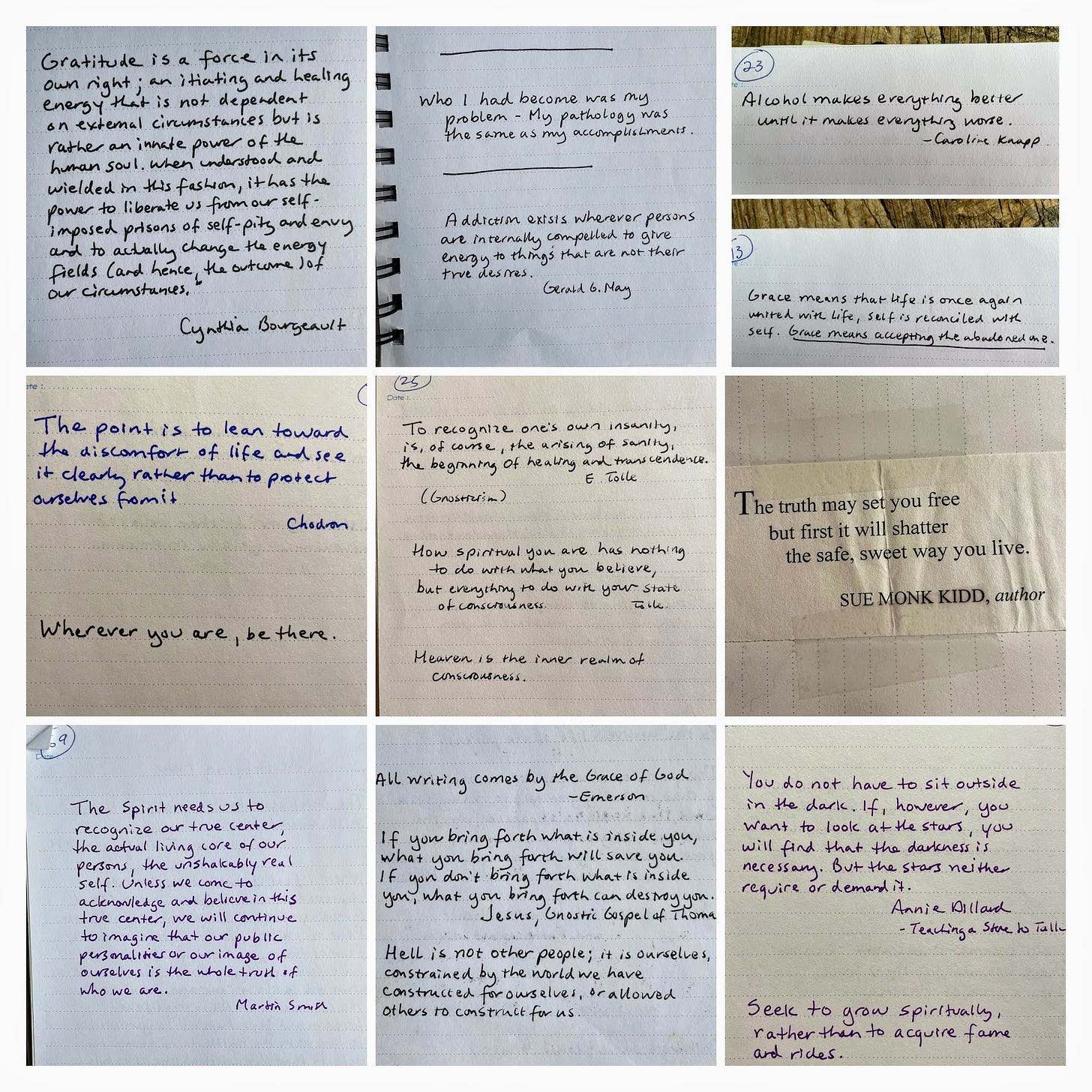
Love this. I’m deep in the navel-gazing, reading, and journaling part of early sobriety, and have been neglected my garden as a result. Seems this is probably the perfect place for me to get re-inspired to get out there and pull some weeds.
I know I read this at one point early in my substack reading days, but it seems I didn't tell you how much I love your stacks of books! Under the Influence by James Milam and Katherine Ketcham was a life changer for me. I went out to interview Dr. Milam's then wife, Doris, at their recovery center. This was for a job for King County in my early twenties profiling services throughout the greater Puget Sound area. Doris refused to answer my printed questions, but instead walked me through the wards and did what I later learned to be sharing experience, strength and hope. I couldn't wait to get away because I needed my lunchtime drink. Instead, I threw up in the parking lot, turned around, returned to her office and said, "Um, I think I might have a problem." Then went on to tell her why I didn't. Fifty years later, of course, I know she saw everything on the face, body, and soul of the child I was. Not longer after that, after attending a few of Dr. Milam's free Saturday lectures, I found supportive groups of other young people. What a gift sober life has been for me. So glad to read about yours.